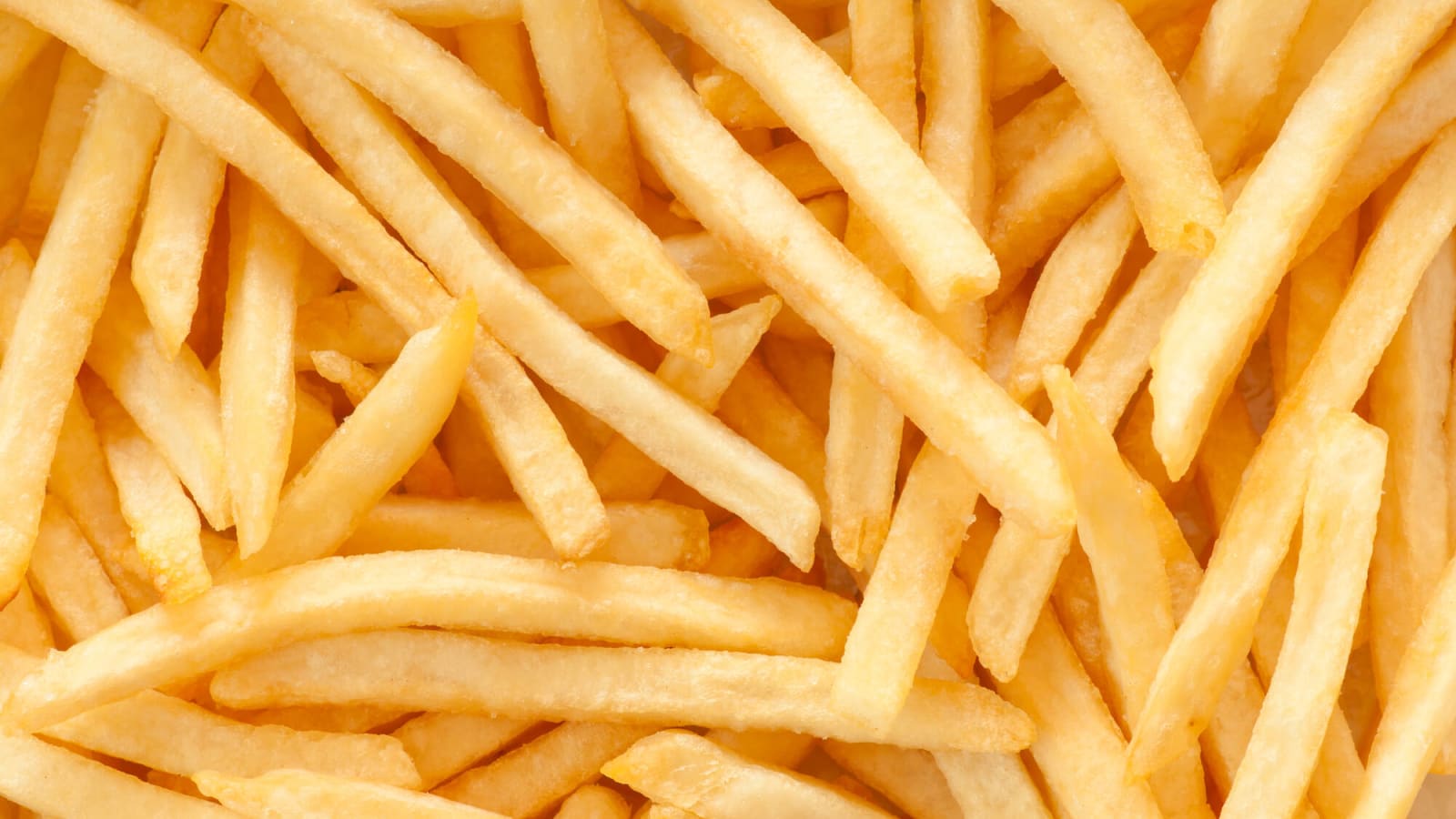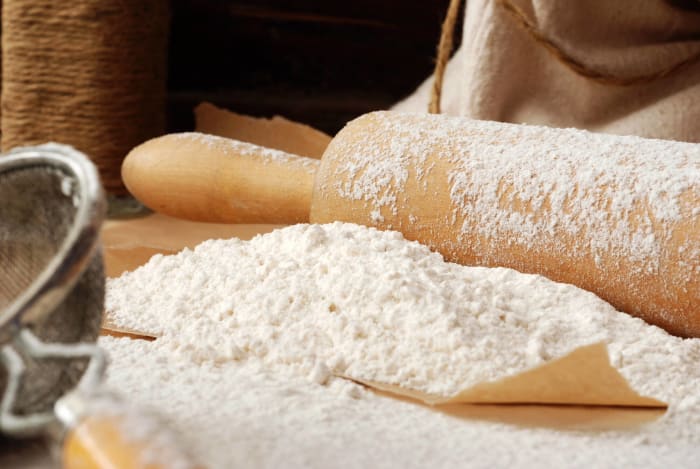Have you ever heard someone from the United Kingdom (England, Northern Ireland, Scotland, and Wales) use a food term that confused you or you’ve never heard before? American English has strayed quite a bit from its British origins over the last few hundred years, so your perplexity is perfectly understandable. Whether you’re using a recipe from abroad, traveling across the pond, or just looking to better understand the characters in your favorite foreign TV shows and movies, here are 21 foods named differently in the U.S. and U.K.
1 of 21
All-purpose flour & plain flour
Marie C Fields / Shutterstock.com
If you’re following a U.K. recipe that calls for plain flour, that’s the same as all-purpose flour in the United States and many other countries. That American moniker is actually a bit of a misnomer, as different types of flour have different applications, so you can’t really use all-purpose flour for every purpose. Cake flour is finer and contains less protein, for instance, and self-rising flour includes both salt and baking powder.
vkuslandia / Shutterstock.com
We always struggle to spell arugula, and it would be much easier to use the British name for this leafy green: rocket. (With half as many syllables, it’s also faster to say.) Either version is better than the botanical name, Eruca vesicaria, which is in the Brassicaceae family alongside the likes of broccoli, cauliflower, kale, radishes, and rapeseed.
3 of 21
Baked potato & jacket potato
Robert Anthony / Shutterstock.com
Since baked potatoes are cooked with the skin still wrapped around them like a coat, this side dish is called a jacket potato in parts of the United Kingdom. In fact, some people even use the long name “potato in a jacket”! (The most popular toppings across the pond? Butter, cheese, beans, and even tuna fish.)
Ivanna Pavliuk / Shutterstock.com
You might not know that beets and beetroot are the same thing because you might not know that beets are actually the roots of the beet plant. They are, which is why beets (along with carrots, radishes, potatoes, and yams) are classified as root vegetables. Remember that the next time you see “beetroot” in a British recipe!
Nataliia Pyzhova / Shutterstock.com
Once upon a time, using the term “sweets” for candy was commonplace in the U.S. However, times have changed, and now “candy” is the preferred name for confectionary treats. That alteration never occurred in the United Kingdom, where folks still use “sweets” to refer to candy, chocolate, and toffee. However, “candy” is used in the U.K. in certain cases, one of which we’ll get into shortly.
Olga Dubravina / Shutterstock.com
If you’re looking for a bag of chips in England, you’ll want to ask for “crisps.” This one makes a lot of sense, as potato chips are indeed crispy. However, the real reason for the difference in terminology is that when potato chips first became popular in the U.K, the term “chips” was already in use…but more on that later!
7 of 21
Cilantro & coriander
Halil ibrahim mescioglu / Shutterstock.com
This one’s pretty straightforward. In the U.S., coriander refers to a spice made of ground coriander seeds, while cilantro refers to the leaves of the coriander plant. In the U.K., they simply call both versions “coriander.”
8 of 21
Cookies & biscuits
larry mcguirk / Shutterstock.com
British people call cookies “biscuits,” although they’re usually using the term to refer to a thin, crispy type of cookie. Some folks in the U.K. occasionally use the term “cookies” for thicker, doughier versions of the baked goods — which makes sense, as “cookie” comes from the Dutch word koekje, meaning “little cake.”
9 of 21
Cotton candy & candy floss
wizdata / Shutterstock.com
Candy floss sounds like an edible version of the string used to clean between your teeth (gross), but it’s actually just the British name for the spun sugar confection Americans call cotton candy. If you think that difference is odd, get this: In Australia, it’s called fairy floss!
10 of 21
Dessert & pudding
Africa Studio / Shutterstock.com
While Americans use “pudding” to refer specifically to sweet, custard-like treats, residents of the United Kingdom use it for any number of vastly different types of dessert, or as a synonym for dessert in general. If you want to talk about American pudding when you’re abroad, good luck! There’s no direct translation, and you’ll likely have to describe it as a custard-like or mousse-like dessert that’s somewhat similar to the French pot de crème, which some Brits might be more familiar with.
11 of 21
Eggplant & aubergine
Opanas / Shutterstock.com
We always thought “eggplant” was an odd name for this purple vegetable (it’s because the white versions look like chicken or goose eggs), but that’s what it’s called in the United States as well as Canada, Australia, New Zealand, and a few other countries. But in England, India, France, and Germany, it’s called an “aubergine,” a name which has Arabic roots.
12 of 21
English muffins & crumpets
Michael C. Gray / Shutterstock.com
Here’s a shocker: English muffins are not called muffins in England. Instead, the term “English muffin” was coined as a way to describe an American interpretation of the British crumpet, which is a small, round, griddled, and porous bread that has a spongy texture. Among the differences: In the U.K., the nooks and crannies are on top!
13 of 21
Fava beans & broad beans
Brent Hofacker / Shutterstock.com
In “Silence of the Lambs,” Dr. Hannibal Lecter says he ate a census taker’s liver “with some fava beans and a nice Chianti.” However, if Sir Anthony Hopkins, the actor who played Hannibal, was saying this phrase, he probably would have worded it differently. That’s because Hopkins is Welsh, and people in the U.K. generally say “broad beans” instead of “fava beans.”
14 of 21
Fish sticks & fish fingers
stockcreations / Shutterstock.com
Have you ever wondered why Americans sometimes refer to chicken tenders as “chicken fingers” but never call fish sticks “fish fingers”? Folks in the U.K. might be especially puzzled, and they do, in fact, use the term “fish fingers.” Further complicating the matter, Brits rarely say “fish sticks” and tend to call chicken tenders “chicken mini filets”!
Andreea Tudor / Shutterstock.com
When potato chips arrived in England, the country already had a food called chips: French fries. This difference in terminology still confuses tourists to this day, especially when Americans in England order the latter country’s famous fish and chips and surprisingly receive a side of fries.
16 of 21
Popsicle & ice lolly
JeniFoto / Shutterstock.com
At first, learning that people in the U.K. call popsicles “ice lollies” seems strange. Then again, the American term is sort of odd, too, because Popsicle is actually a brand name that has been owned by Good Humor (now Good Humor-Breyers) for the last century. So anything not produced by that specific company should be called an ice pop…or an ice lolly.
17 of 21
Romaine lettuce & cos lettuce
Evgeny Karandaev / Shutterstock.com
In the U.S., the lettuce used in a Caesar salad is known by one name and one name only: Romaine. You may hear this name used across the pond, too, but Romaine is also known as “cos lettuce” in the U.K. The origin of that term is still up for debate. Some say it comes from the Greek island of Cos, where the Mediterranean lettuce variety may have originated. Others speculate that “cos” is an adaptation of “khus,” the Arabic word for lettuce.
18 of 21
Sausage & banger
Rawpixel.com / Shutterstock.com
“Bangers and mash” is such a foreign phrase to Americans that some people in the states don’t even know it refers to a meal. With that bit of information, one might be able to decipher that mash are mashed potatoes, but there’s still no hint that “banger” is British slang for sausage. The now ubiquitous nickname originated during World War II, when food shortages led to more filler (mostly water) being packed into sausage casings, causing them to occasionally explode with a bang when cooked.
19 of 21
Scallions/green onions & spring onions
Pixel-Shot / Shutterstock.com
This one’s a little less cut and dry. Americans refer to these chopped veggies as either scallions or green onions but will generally know what a British person is talking about when they say “spring onions.” Likewise, most people in the U.K. are at least familiar with the names scallions and green onions, even if they’re not their preferred terms.
Foodio / Shutterstock.com
Despite similar appearances, shrimp and prawn are actually two different species; the former is smaller and found in salt water, while the latter is a larger freshwater creature. Americans differentiate, but people in the U.K. usually just call both crustaceans “prawns”
21 of 21
Zucchini & courgette
Valentyn Volkov / Shutterstock.com
Like eggplant, the zucchini name is used in the U.S., Canada, Australia, and New Zealand, but surprisingly, also in Germany, Sweden, Italy, and a few other places. Meanwhile, in England, France, and the Netherlands, they call this summer squash a “courgette.” Regardless of which one you choose, I hope we can all agree both names are better than the offputting South African term “baby marrow.”

 +
+






















